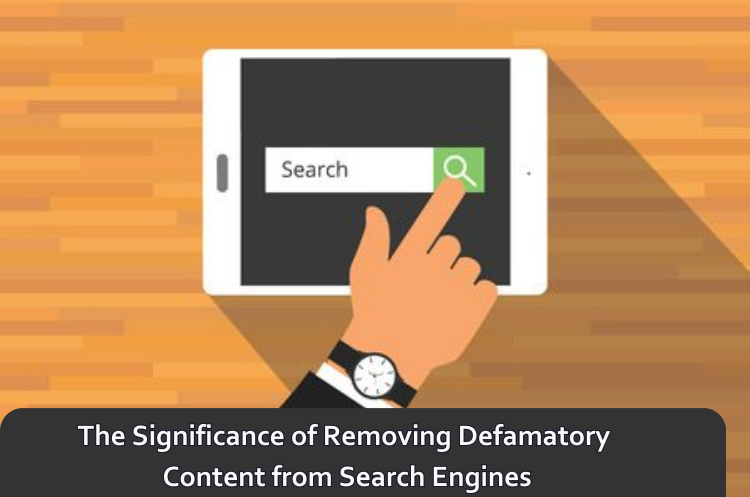
How to Remove Defamatory Content from Search Engines
In today’s digital age, encountering defamatory content on the internet has become an unfortunate reality. Whether it takes the form of a slanderous news article, an opinion piece, or a video, discovering defamatory material associated with your name or business on Google search results can be distressing. Thankfully, there are steps you can take to mitigate this issue. Before delving into the solutions, let’s clarify what constitutes defamation.
Defining Defamation
Defamation occurs when someone makes inaccurate statements about another person, damaging their reputation. Such harm can affect one’s future prospects and opportunities. Examples of defamation include false accusations, such as claiming someone stole money or asserting that someone caused harm when they did not.
Defamatory content and slander can manifest on various online platforms:
Review websites like Google My Business, Yelp, Amazon, or Tripadvisor.
Social media platforms such as Facebook, Instagram, YouTube, or TikTok.
News articles, publications, and online journals.
To establish defamation, certain elements must be present:
A false statement.
A published statement.
The statement caused injury or damages.
The statement was made matter-of-factly.
Without these fundamental elements, it can be challenging to prove a case of defamation. If you discover false accusations being spread about you or your business and have evidence of the false statement, there are actions you can take to clear your name, both privately and legally.
Understanding What Is Not Considered Defamation
The linchpin of a defamation case is the existence of a false statement. If the content in question is true, it will be extremely difficult to have it removed, and attempting to do so could even worsen your reputation.
In cases where you cannot establish slander or libel and require assistance with reputation management, it’s wise to consider seeking the help of a reputation management company. These experts are adept at understanding your situation and devising the best strategies to restore your online reputation.
Identifying Defamatory Online Content
The silver lining is that any wrongfully published statement online causing harm, damages, or injury to an individual’s or business’s character is considered defamatory. This encompasses social media posts, even minor online publications, podcasts, and videos.
Removal of internet defamation is possible for both individuals and businesses, depending on the circumstances. It is crucial to determine which scenario applies to you.
Defamatory Content Targeted at Individuals
The most common scenario involves defamatory content aimed at individuals. This could include a viral tweet spreading falsehoods about you, an opinion piece containing baseless accusations, and more. If the statement includes your private personal information, you can typically submit a removal request through Google or engage with the content creator to address the issue offline.
Defamatory Content Targeted at Businesses
Defamatory statements directed at brands and businesses can significantly harm their reputations and financial performance. If someone makes a false statement about your services in online reviews, you can contact Google to request the removal of the slanderous content. In severe cases of libel, it’s advisable to consult an internet defamation attorney specializing in this area of law.
The Significance of Removing Defamatory Content from Search Engines

Defamatory content can rank prominently in search engines, making it easily accessible to users. If not addressed promptly, it can cause significant harm to your reputation. Compelling headlines, especially those making headlines in the news cycle, tend to attract a lot of attention and clicks. As a result, they rank high and can inflict substantial damage to your reputation, especially if they reach the first page of Google.
Steps to Remove Defamatory Content from Search Engines
Discovering defamatory or slanderous content about yourself or your business online can trigger anxiety. However, you can take several steps to rectify any libelous information you encounter:
Step 1: Reach out to the site owner
Initiating contact with the site owner is often the first recommended step. This allows you to review the posted information and present evidence to counter the claims. In cases involving online news publications, it’s possible that the reporter didn’t rely on truthful sources, and you may negotiate edits with the editor. Alternatively, you can request the removal of your name or business name from the headline, explaining how the content has harmed you. If you receive no response or agreement from the site owner, proceed to the next step.
Step 2: Suppress Defamatory Content
To prevent damaging content from appearing prominently in search results, consider using content suppression. This entails creating new websites, blogs, or social media accounts with content that includes relevant keywords, pushing the defamatory content down in search results, ideally onto the second page of Google searches. This approach is an effective strategy for taking control of your brand’s online presence.
Next, let’s discuss how to request content removal specifically from Google.
Step 3: Request Removal Through Google
Google offers a mechanism for reporting libelous and defamatory content that appears on any of its products. Follow these steps:
Visit Google’s troubleshooting page for filing takedown reports: Google Takedown Reports.
Choose the Google product on which the defamatory content is displayed.
Select the relevant option based on your situation. For this purpose, choose “Other Legal Issue > Defamation.”
Click “Submit Request” to complete the process. If this doesn’t resolve the issue, proceed to the final step of removing slander from Google.
Step 4: Filing a Defamation Lawsuit
Taking legal action can motivate even the most resistant offenders to reconsider their stance on content removal. Hiring an attorney specializing in defamation is a crucial step, as they can help you seek compensation for damages and financial losses incurred due to the libelous content. Establishing a strong attorney-client relationship can streamline the resolution of your case.
Your attorney can assist in obtaining an injunction, a court order that compels the offender to cease producing defamatory content and remove existing defamatory content on your behalf. This legal notice informs the offender about the damages they have caused and serves as a preventive measure to avoid further harm. If the offender still refuses to take action, you, as the plaintiff, can decide whether to file a lawsuit.
In situations where handling defamatory content becomes overwhelming, it’s advisable to seek professional assistance. Companies like “Build Brand Better” specialize in online reputation management and have a track record of successfully restoring their clients’ online reputations. We work diligently to ensure that defamatory content is removed from search engines, allowing you to regain control over your online presence and protect your reputation.
In conclusion, addressing defamatory content on Google requires a strategic approach, from reaching out to site owners and content suppression to requesting removal through Google and, if necessary, pursuing legal action. Remember that professional assistance is readily available from online reputation management experts like “Build Brand Better,” who can guide you through the process and help safeguard your online reputation.
FAQ
Q1: What is defamation, and how does it affect individuals and businesses?
A: Defamation is the act of making false statements about a person or business, damaging their reputation. The harm inflicted by defamation can have significant consequences, affecting one’s future prospects and opportunities.
Q2: What platforms can defamatory content and slander be found on?
A: Defamatory content and slander can be encountered on various online platforms, including review websites like Google My Business, social media platforms such as Facebook and Instagram, news articles, and online journals.
Q3: What are the essential elements of a defamation case?
A: To establish a defamation case, four core elements must be present:
A false statement.
A published statement.
The statement caused injury or damages.
The statement was made matter-of-factly.
Q4: How can I differentiate between defamation and truthful statements?
A: The key factor in a defamation case is the presence of a false statement. If the content is accurate, it’s challenging to have it removed, and attempting to do so may worsen your reputation.
Q5: When should I consider hiring a reputation management company?
A: If you cannot prove slander or libel and require help with your online reputation, it’s advisable to consider enlisting the services of a reputation management company. They are experts in understanding your situation and formulating effective strategies to restore your online reputation.
For more Blogs:- www.buildbrandbetter.io/blog/
